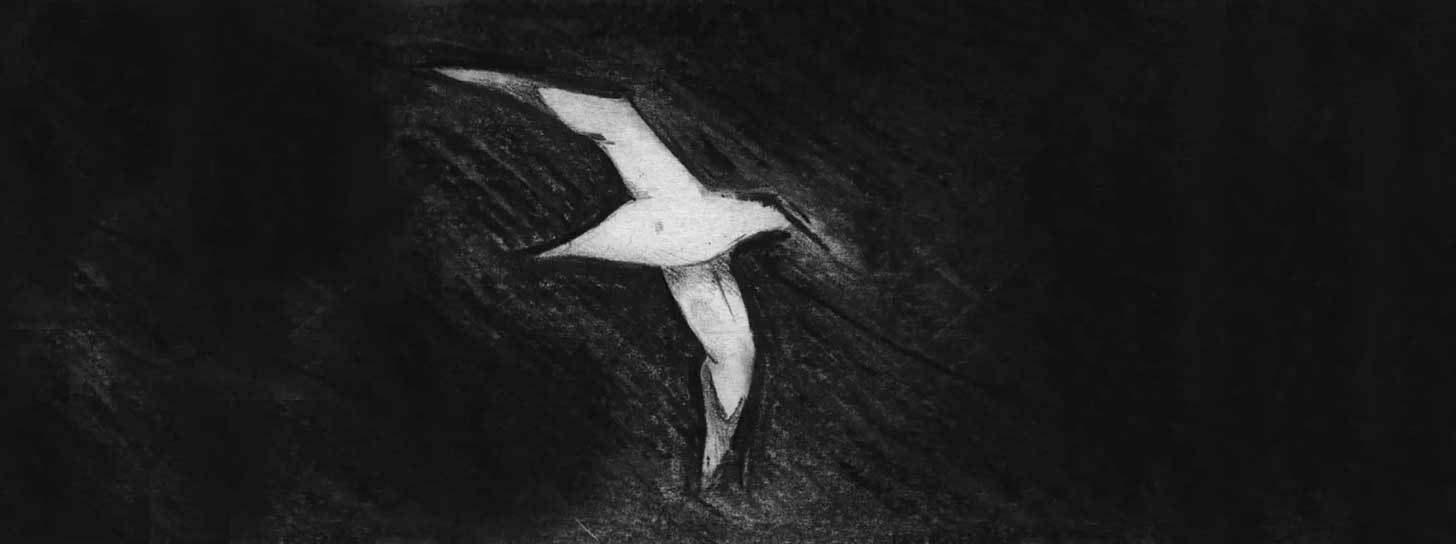Grey mist softens the black night, turning twenty individuals—strung out in a line of silently observant walkers—into an extended, single mass. We move slowly in a wide circle around the outside edge of the island. Faces down, our head torches drill into the ground and create an ever-fluctuating dance of alien lights over grass.
Once every ten years, the shearwater census absorbs the lives and night time attention of island staff and an ever-changing population of volunteers. Tonight, I am the backstop, walking the cliff to protect this week’s volunteers—unfamiliar with the terrain—from plunging through the mist to invisible rocks below.
Through the velvet grey, the cliff edge is visible only as a half-erased line that merges into open sky. All it would take is a single mis-step, calculated or otherwise, and I would vanish into the mist, unseen, unheard, unnoticed. As long as I see the others, I am seen. I exist. The border of reality, only yards away, must be resisted.
Born in black and airless holes in the ground, the fledgling shearwaters emerge at night, climbing to the highest point they can find—a small rock, a dense clump of bracken, or one of the spongy, grassy knolls that litter this trip-hazard of a landscape. They stretch their wings, lean into the wind, and practice for the coming night when, soft down expended, adult plumage complete, they will launch themselves from the cliff for the first time, and into a new life.
It is the height of damp Welsh summer on an island where the only light pollution comes from the stars.
Born in black and airless holes in the ground, the fledgling shearwaters emerge at night, climbing to the highest point they can find—a small rock, a dense clump of bracken, or one of the spongy, grassy knolls that litter this trip-hazard of a landscape.
On clear nights, when predatory gulls have the advantage, far fewer birds emerge from their protective burrows. But in the days following a full moon, the island is littered with stripped corpses—wings complete with feathers, and keel bones connected by strings of inedible gristle. Consumed bellies facing the sky in a position of open submission.
On clouded and foggy nights such as this, when visibility is low, we catch many, many more—extending the process and the time we spend in the exposing damp. Every night for a month we return to our task, exhausting ourselves with the endless cycle of catching, ringing, releasing—adding to the collective knowledge of a disappearing species.
To my left, Paul and Steve moderate our pace. With only two ringers and hundreds of juvenile birds to be banded, we make slow progress.
—Whoa!
Paul calls us all to a gentle halt. The ringers need time to catch up with the glut of birds. The catchers descend to the ground, soaking up a few sleep-deprived moments of relaxation. I do a quick head count—picking out circles of black heads in the grey. It is going to be a long night.
The voices of rest of the team, catch me softly. Conversation is minimal.
Encased from head to toe in synthetic wool and an armour of Goretex, I lie back in the bracken.
The delicate tracery of Eocene leaves rises around me, framing my vision of the sky and entombing me in a comforting—damp—black—hole. I could sleep here forever. I face my head torch into the direction of the gentlest of softly soaking mizzles. A vortex of stars—the finest of rain drops caught in the torchlight—rushes toward me in the black, sucking me in, inescapable, catching the light and spitting it out, spent, at the periphery of my vision.
—Wooooooowwwwwww — —
Beside me, Becca is in a vortex of her own.
—Who needs LSD?
My early memories are minimal—a few staccato moments without context. Having packed my life into boxes for a move several years ago, I never had the space to unpack my books and photos. I lost my tenuous connection to my own memory. I lost myself. I stopped writing.
Three years later, I bought a wall of bookshelves. I spent days unpacking, sorting and filing memories—finding snippets of myself from pre-teen to young adult in a forgotten album. I started to write again—short pieces inspired by photos and drawings—recovering insignificant days or moments which collectively add up to me.
It’s a practice I’ve come back to intermittently. An ongoing project to recover and capture these memories.
Skomer Island NNR, off the Pembrokeshire coast is home to one of the world' largest colonies of Manx shearwaters (Puffinus puffinus). The island is open to visitors from April to September, but if you want to experience the shearwaters, you'll need to book an overnight visit. The shearwater census still takes place every ten years but, due to funding restrictions, the labour-intensive long nights of ringing are no more and a different approach has been adopted.








What a wonderful, if a little scary at times, experience!
I know it’s over thirty year since I was resident in the UK but HOW did I not know of this island? I’ve googled it, just now... because I needed to know of such a land mass and it’s shearlings, it looks, from Googles satellite eye, as if almost the entire space is rock covered with bracken. I imagine it on the misty night of your census and am envious beyond words... thank you for sharing Miranda, I am one island wiser!
This was so interesting- what experiences you’ve had! I also love the pull quote describing the scene. Just beautiful.